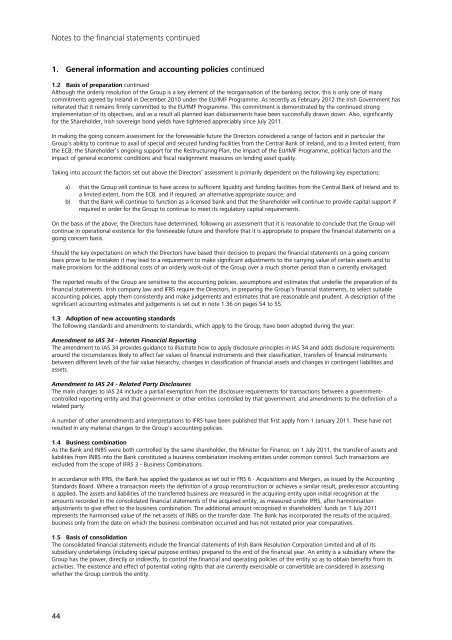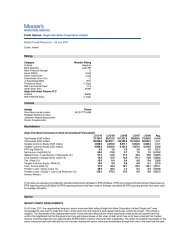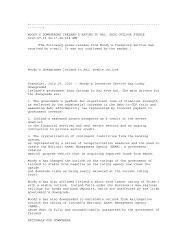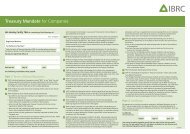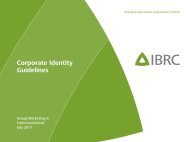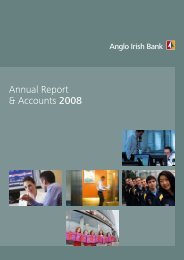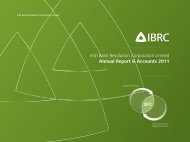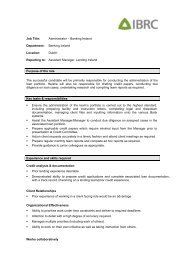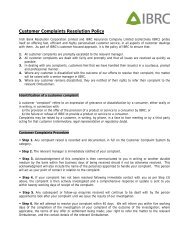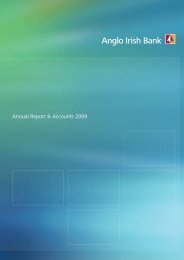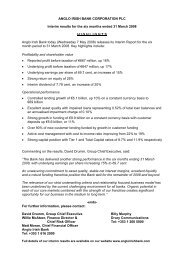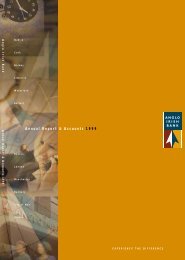IBRC annual report for 2011 - Irish Bank Resolution Corporation ...
IBRC annual report for 2011 - Irish Bank Resolution Corporation ...
IBRC annual report for 2011 - Irish Bank Resolution Corporation ...
You also want an ePaper? Increase the reach of your titles
YUMPU automatically turns print PDFs into web optimized ePapers that Google loves.
Notes to the financial statements continued1. General in<strong>for</strong>mation and accounting policies continued1.2 Basis of preparation continuedAlthough the orderly resolution of the Group is a key element of the reorganisation of the banking sector, this is only one of manycommitments agreed by Ireland in December 2010 under the EU/IMF Programme. As recently as February 2012 the <strong>Irish</strong> Government hasreiterated that it remains firmly committed to the EU/IMF Programme. This commitment is demonstrated by the continued strongimplementation of its objectives, and as a result all planned loan disbursements have been successfully drawn down. Also, significantly<strong>for</strong> the Shareholder, <strong>Irish</strong> sovereign bond yields have tightened appreciably since July <strong>2011</strong>.In making the going concern assessment <strong>for</strong> the <strong>for</strong>eseeable future the Directors considered a range of factors and in particular theGroup’s ability to continue to avail of special and secured funding facilities from the Central <strong>Bank</strong> of Ireland, and to a limited extent, fromthe ECB, the Shareholder’s ongoing support <strong>for</strong> the Restructuring Plan, the impact of the EU/IMF Programme, political factors and theimpact of general economic conditions and fiscal realignment measures on lending asset quality.Taking into account the factors set out above the Directors’ assessment is primarily dependent on the following key expectations:a) that the Group will continue to have access to sufficient liquidity and funding facilities from the Central <strong>Bank</strong> of Ireland and toa limited extent, from the ECB, and if required, an alternative appropriate source; andb) that the <strong>Bank</strong> will continue to function as a licensed bank and that the Shareholder will continue to provide capital support ifrequired in order <strong>for</strong> the Group to continue to meet its regulatory capital requirements.On the basis of the above, the Directors have determined, following an assessment that it is reasonable to conclude that the Group willcontinue in operational existence <strong>for</strong> the <strong>for</strong>eseeable future and there<strong>for</strong>e that it is appropriate to prepare the financial statements on agoing concern basis.Should the key expectations on which the Directors have based their decision to prepare the financial statements on a going concernbasis prove to be mistaken it may lead to a requirement to make significant adjustments to the carrying value of certain assets and tomake provisions <strong>for</strong> the additional costs of an orderly work-out of the Group over a much shorter period than is currently envisaged.The <strong>report</strong>ed results of the Group are sensitive to the accounting policies, assumptions and estimates that underlie the preparation of itsfinancial statements. <strong>Irish</strong> company law and IFRS require the Directors, in preparing the Group's financial statements, to select suitableaccounting policies, apply them consistently and make judgements and estimates that are reasonable and prudent. A description of thesignificant accounting estimates and judgements is set out in note 1.36 on pages 54 to 55.1.3 Adoption of new accounting standardsThe following standards and amendments to standards, which apply to the Group, have been adopted during the year:Amendment to IAS 34 - Interim Financial ReportingThe amendment to IAS 34 provides guidance to illustrate how to apply disclosure principles in IAS 34 and adds disclosure requirementsaround the circumstances likely to affect fair values of financial instruments and their classification, transfers of financial instrumentsbetween different levels of the fair value hierarchy, changes in classification of financial assets and changes in contingent liabilities andassets.Amendment to IAS 24 - Related Party DisclosuresThe main changes to IAS 24 include a partial exemption from the disclosure requirements <strong>for</strong> transactions between a governmentcontrolled<strong>report</strong>ing entity and that government or other entities controlled by that government, and amendments to the definition of arelated party.A number of other amendments and interpretations to IFRS have been published that first apply from 1 January <strong>2011</strong>. These have notresulted in any material changes to the Group's accounting policies.1.4 Business combinationAs the <strong>Bank</strong> and INBS were both controlled by the same shareholder, the Minister <strong>for</strong> Finance, on 1 July <strong>2011</strong>, the transfer of assets andliabilities from INBS into the <strong>Bank</strong> constituted a business combination involving entities under common control. Such transactions areexcluded from the scope of IFRS 3 - Business Combinations.In accordance with IFRS, the <strong>Bank</strong> has applied the guidance as set out in FRS 6 - Acquisitions and Mergers, as issued by the AccountingStandards Board. Where a transaction meets the definition of a group reconstruction or achieves a similar result, predecessor accountingis applied. The assets and liabilities of the transferred business are measured in the acquiring entity upon initial recognition at theamounts recorded in the consolidated financial statements of the acquired entity, as measured under IFRS, after harmonisationadjustments to give effect to the business combination. The additional amount recognised in shareholders’ funds on 1 July <strong>2011</strong>represents the harmonised value of the net assets of INBS on the transfer date. The <strong>Bank</strong> has incorporated the results of the acquiredbusiness only from the date on which the business combination occurred and has not restated prior year comparatives.1.5 Basis of consolidationThe consolidated financial statements include the financial statements of <strong>Irish</strong> <strong>Bank</strong> <strong>Resolution</strong> <strong>Corporation</strong> Limited and all of itssubsidiary undertakings (including special purpose entities) prepared to the end of the financial year. An entity is a subsidiary where theGroup has the power, directly or indirectly, to control the financial and operating policies of the entity so as to obtain benefits from itsactivities. The existence and effect of potential voting rights that are currently exercisable or convertible are considered in assessingwhether the Group controls the entity.44


